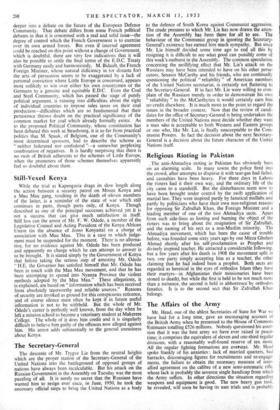The Secretary-General
The descents of Mr. Trygve Lie from the neutral heights which are the proper station of the Secretary-General of the United Nations into the battleground of opposed groups of nations have always been incalculable. But his attack on the Russian Government in the Assembly on Tuesday was the most puzzling of all. It is surely no secret that the Russians have wanted him to resign ever since, in June, 1950, he took the necessary official steps to bring the United Nations as a body to the defence of South Korea against Communist aggression. The crude pressure to which Mr. Lie has now drawn the atten- tion of the Assembly has been there for all to see. The behaviour of the Communist group in ignoring the Secretary- General's existence has earned him much sympathy. But since Mr. Lie himself decided some time ago to end all this by resigning it is difficult to see what good can possibly come of this week's outburst in the Assembly. The common speculation concerning the mollifying effect that Mr. Lie's attack on the Russians may have been intended to have on his other perse- cutors, Senator McCarthy and his friends, who are continually questioning the political " reliability " of American members of the United Nations secretariat, is Certainly not flattering to the Secretary-General. If in fact Mr. Lie were willing to com- plain of the Russians merely in order to demonstrate his own " reliability " to the McCarthyites it would certainly earn him no credit elsewhere. It is much more to the point to regard the issues in the broader context. Now that the review of candi- dates for the office of Secretary-General is being undertaken the members of the United Nations must decide whether they want a man who is acceptable to both Western and Eastern groups or one who, like Mr. Lie, is finally unacceptable to the Com- munist Powers. In fact the decision about the next Secretary- General is a decision about the future character of the United Nations itself.


































 Previous page
Previous page